GUISE- A LASTING IMPRESSION
2022
A Multi-sensory Interactive Installation
by Ting-Yu Lee, Devanshi Rungta, Jingyi Ma, and Jiaying Li
by Ting-Yu Lee, Devanshi Rungta, Jingyi Ma, and Jiaying Li
We are living in an age of 7 seconds – whether its social media, an artwork at a museum, or a piece of news on the television.
The time taken to decide and assess what content we wish to interact with and whether we like it or not, has been reducing.
So why should our interactions with humans be any different?
According to Psychologist Linda Blair, the first 7 seconds are the most important when meeting a stranger for the first time. One can make basic judgments about another person within 7 seconds, which they call the "7-second test". Although this statement cannot be absolute, first impressions are indeed important for the further development of interpersonal relationships.
This notion, however, is not new to us - first impressions were extremely important for our ancestors for survival from the perspective of evolutionary psychology. The ability to make snap decisions about whether or not something was a threat kept them alive.
Our size-up of people is still operating - and it operates at lightening speed. We form an impressions about someone based on our perceptions, on an unconscious level.
That initial size-up and memory storage of the first encounter tend to persist. That is, there is a primacy effect in the impression formation. Some theoretical analyses account for this effect by holding that the first received information is given greater weight in the perceiver's mind than is the later information; others propose that the initial information shapes the meaning subsequently given to the later information.
According to Psychologist Linda Blair, the first 7 seconds are the most important when meeting a stranger for the first time. One can make basic judgments about another person within 7 seconds, which they call the "7-second test". Although this statement cannot be absolute, first impressions are indeed important for the further development of interpersonal relationships.
This notion, however, is not new to us - first impressions were extremely important for our ancestors for survival from the perspective of evolutionary psychology. The ability to make snap decisions about whether or not something was a threat kept them alive.
Our size-up of people is still operating - and it operates at lightening speed. We form an impressions about someone based on our perceptions, on an unconscious level.
That initial size-up and memory storage of the first encounter tend to persist. That is, there is a primacy effect in the impression formation. Some theoretical analyses account for this effect by holding that the first received information is given greater weight in the perceiver's mind than is the later information; others propose that the initial information shapes the meaning subsequently given to the later information.
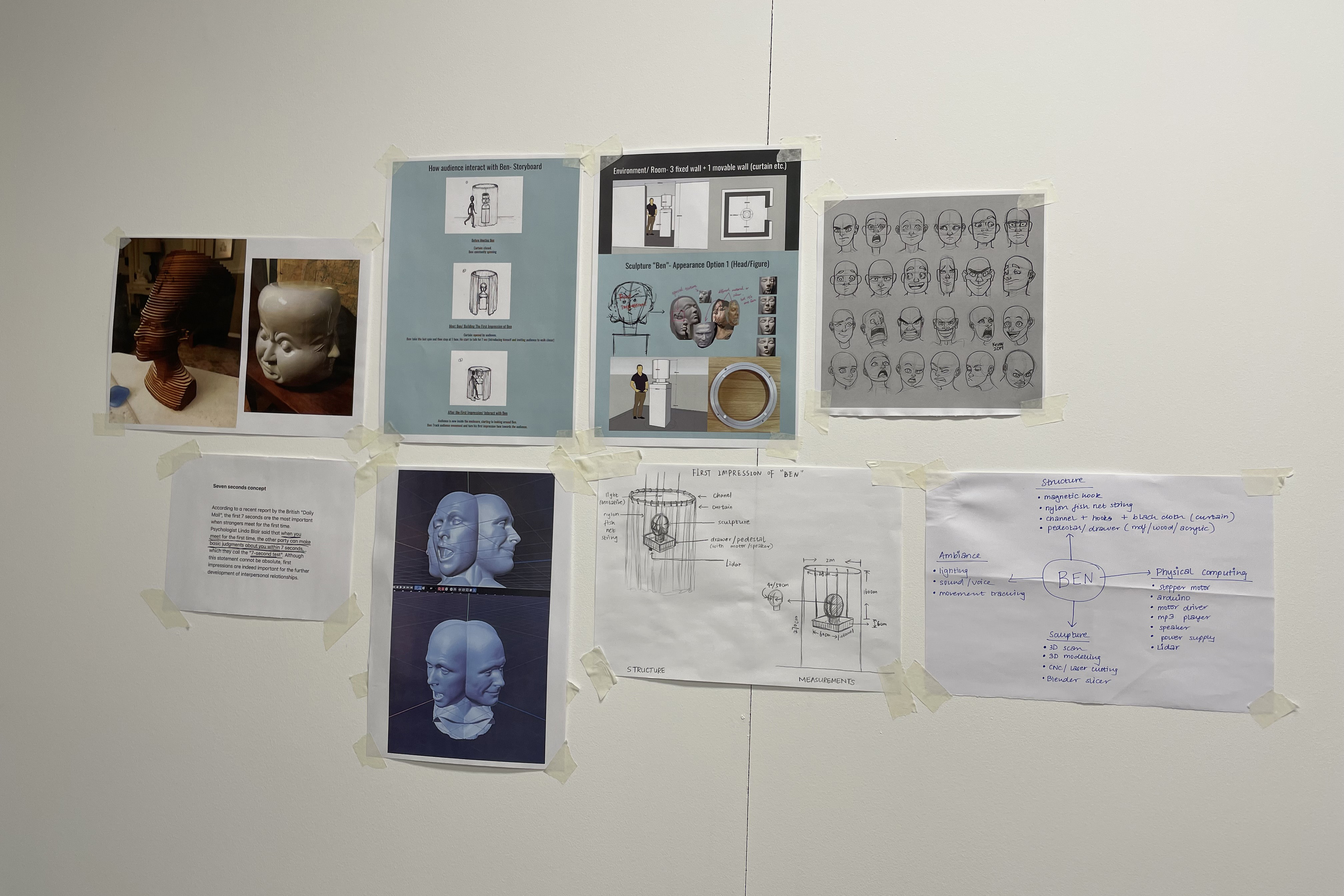
A variety of factors such as facial shape, vocal inflection, and general emotional state
influence one's first impression. These first impressions, however right or wrong they
might be, tend to stay with us for a long time and determine the light in which we continue
to look at someone.
People tend to get attached to their initial impressions of others and find it very difficult to change their opinion, even when presented with evidence to the contrary.
People tend to get attached to their initial impressions of others and find it very difficult to change their opinion, even when presented with evidence to the contrary.
Our piece explores the relationship between the human psyche and first impressions, by way of introducing us to Ben - an odd-looking 4-dimensional structure.
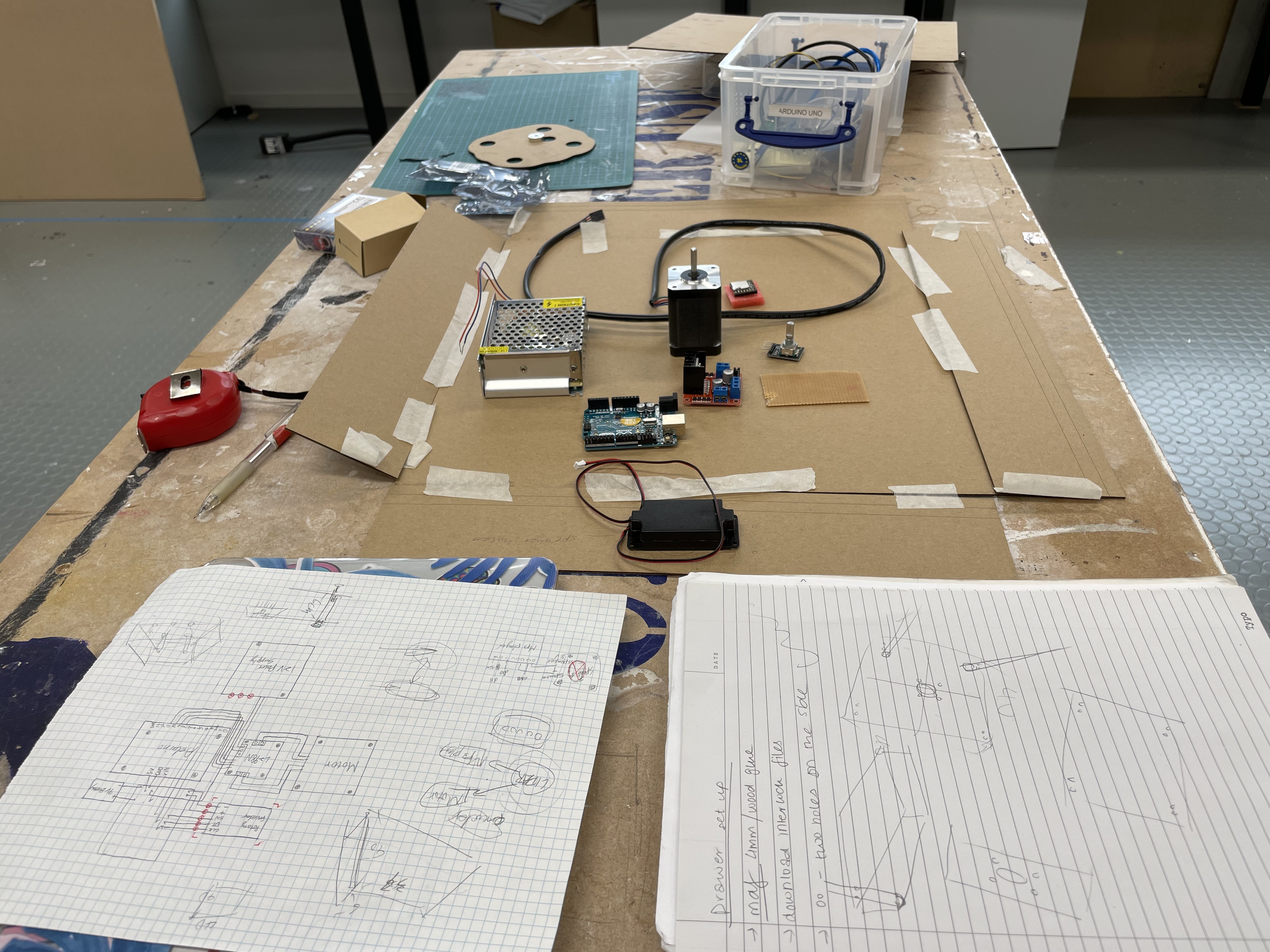
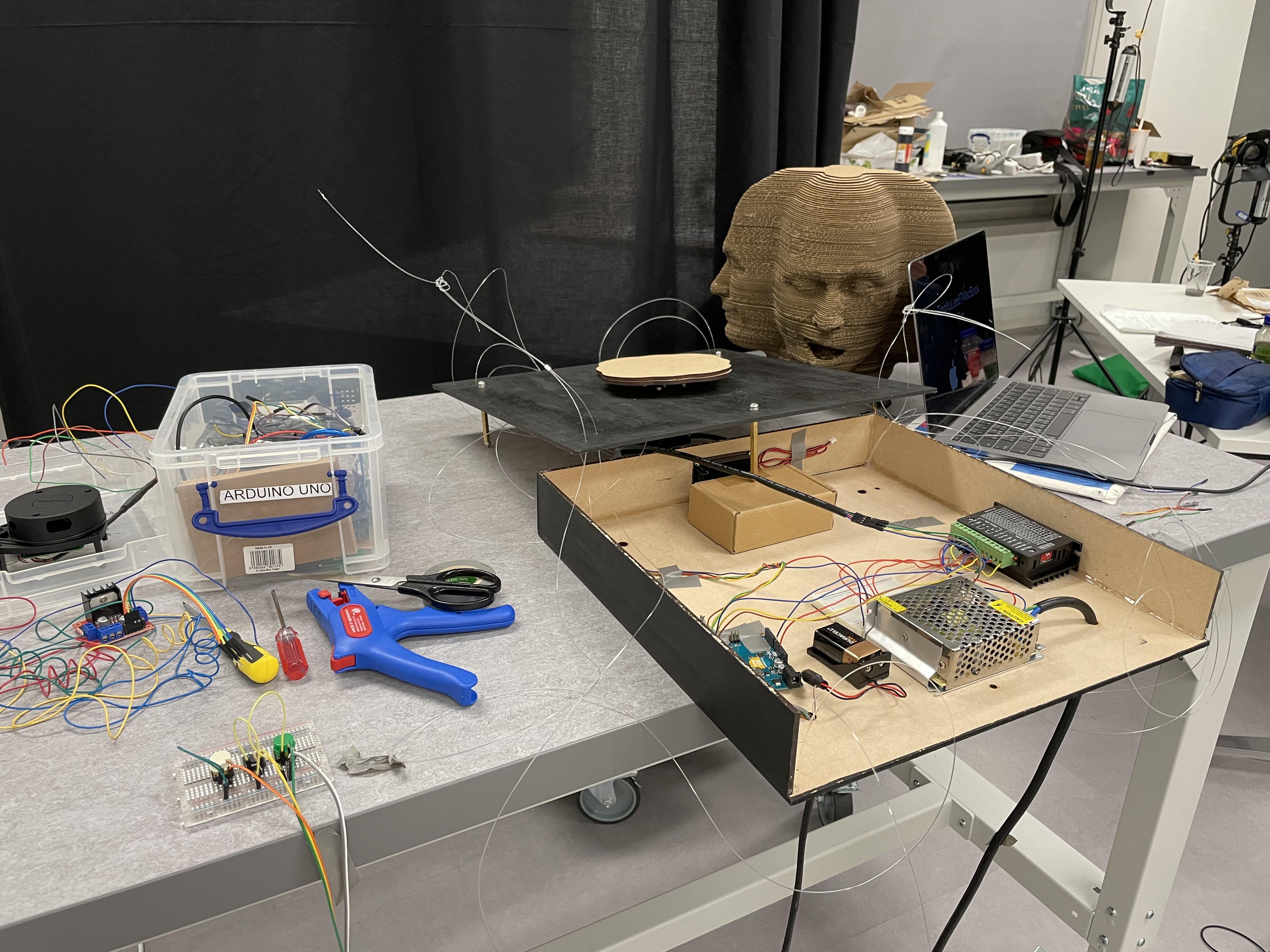
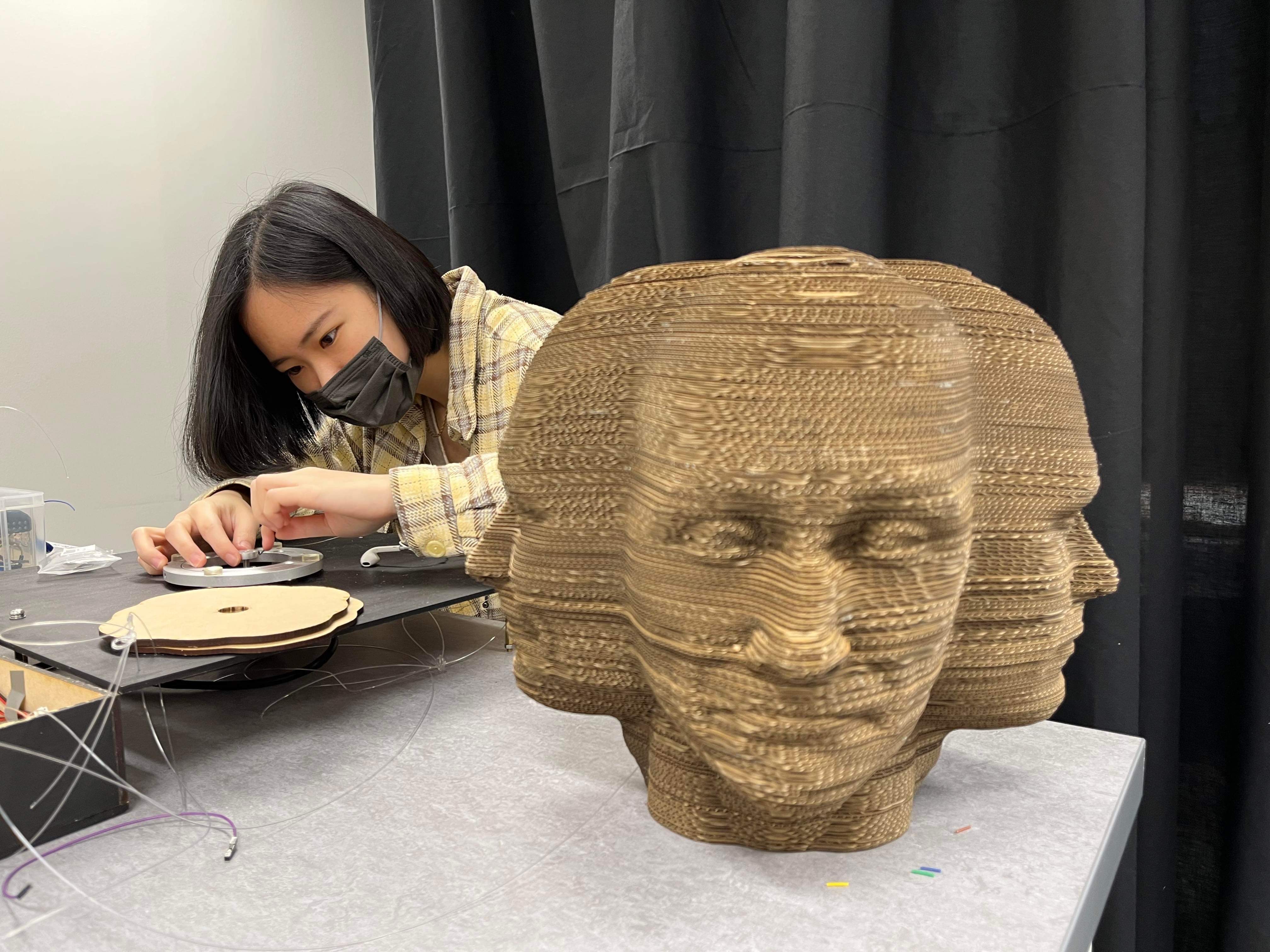
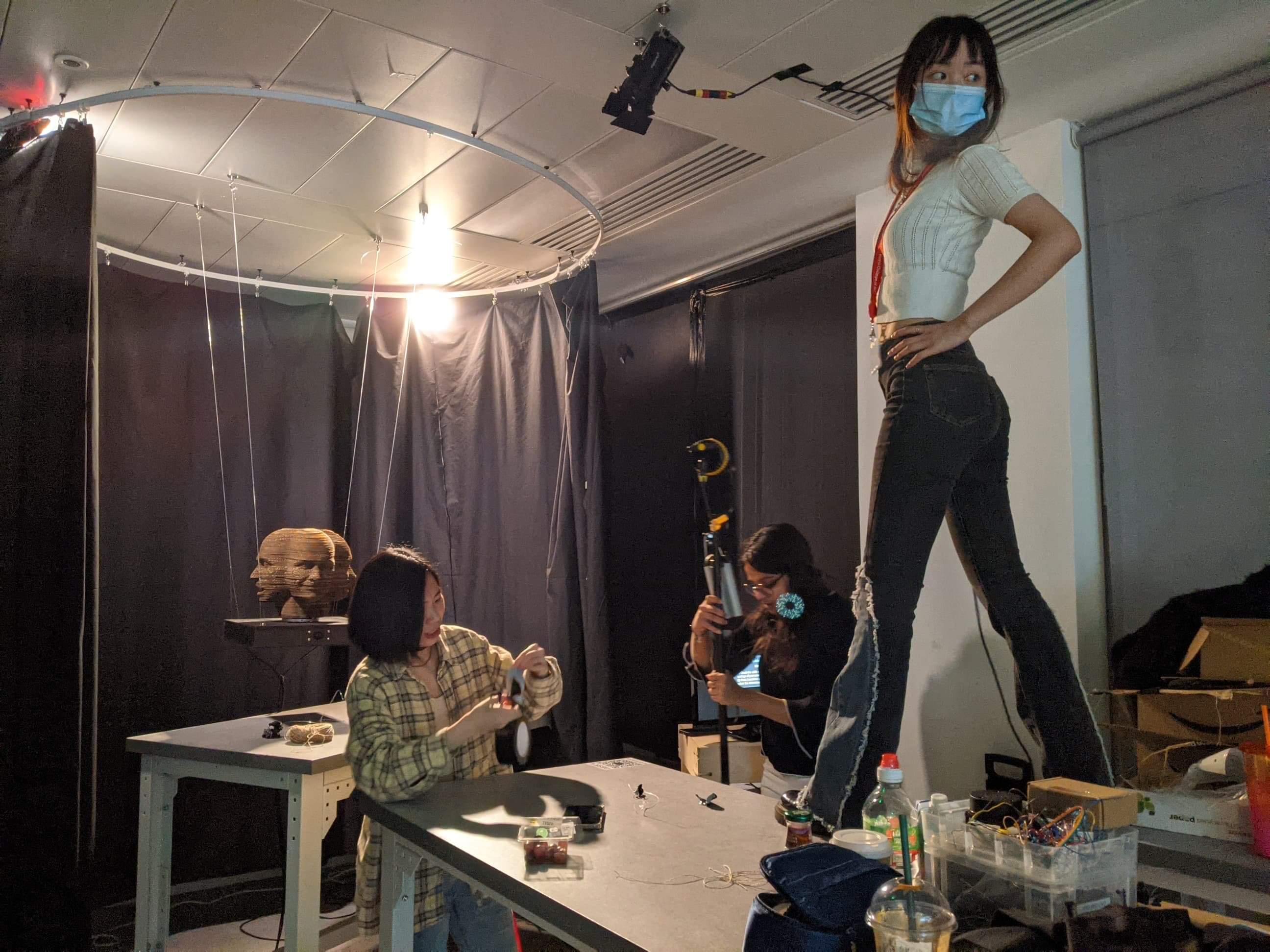
Designed to be experienced by just one participant at a time, the installation is centered around the viewer's first interaction with Ben - a sculpture personified to be our protagonist. Ben has four distinct sides - each side is in the form of a face representing a different emotion – symbolic to the many sides every person has. The four expressions depicted here are confidence, nervousness, flirtatiousness, and sarcasm: personality traits one might display while meeting someone for the first time.
The experience begins with the appearance of a shadow of a revolving sculpture within a curtained enclosure. Anyone inquisitive about the piece is welcome to open the curtain. As soon as the curtain is opened and the participant steps inside, the sculpture gets triggered and stops spinning. As a result, only one particular"face"of "Ben" is clearly visible: the one directly looking at the participant. The narration lasts for 7 seconds and this interaction – where you can see and hear ben – almost becomes a metaphor for a first encounter one would have with a stranger.
In what appears to be a short span of time, the participant starts building an opinion/ impression about Ben based on their own perceptions. Prompted by the narration to walk around, they are now free to steer the experience and decide how to interact with Ben next. As they move through the space, the sculpture moves with them, engaging them almost in a comical poetic dance – so that the same side of Ben is being seen by them throughout. They can't look past this side – they can see he has others sides, but the first impression that stuck with them is so strong that they can't bring themselves to experience the other sides as much as they try, even when they're there in front of them. The movement tracking becomes essential as it brings to life this idea that once we've formed a first impression of someone it's really difficult to get rid of it and it overshadows our subsequent interactions with them. This impression might be right or wrong depending on our perception, but it is only a fragment of the whole.
The piece was first shown in campus exhibition where we got opportunity to test audience interaction and recieved feedbacks from other students and professionals. Later this piece got selected and being invited to display on Fringe Art Festival in Bath.
What kind of personality do you think Ben has?
Will you change your first opinion on someone easily?
Answer can be multiple and diverse. Indeed, there is no right answer. But as we start to open questions and invite audiences to share their thoughts, people begin to think and talk about it, awareness towards the concept of first impression can therefore be raised.